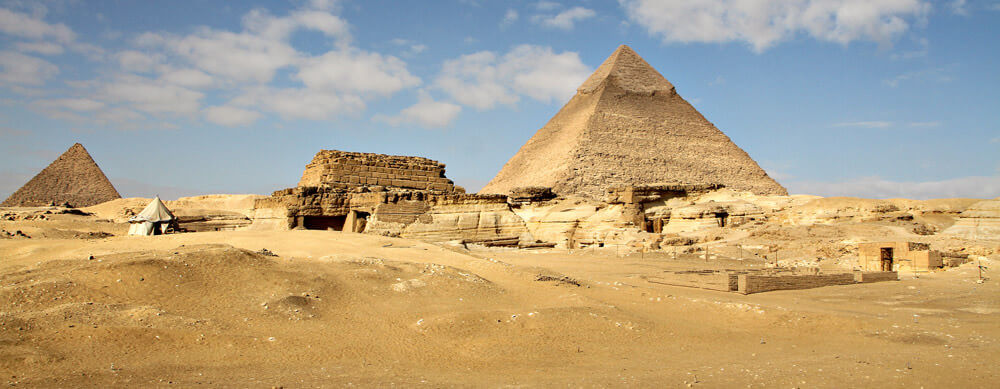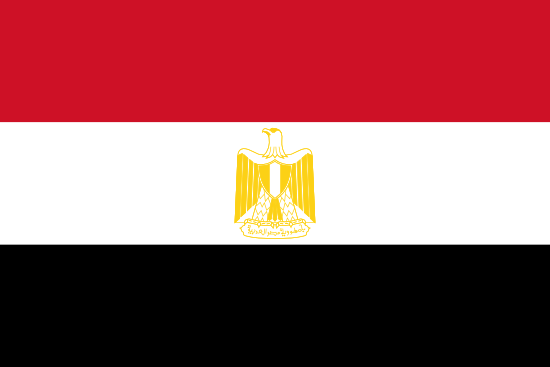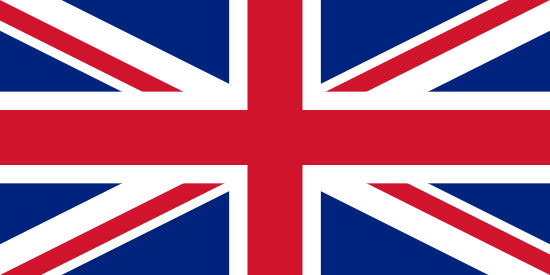

Travel Vaccines and Advice for Egypt
Egypt’s 3,000 year history is rich and complex, filled with more than just mummies and pyramids. This land has ties to people and places that existed millenniums ago.
There are many sights to see in Egypt. The pyramids of Giza, the oldest of the original seven wonders of the world, remain still largely intact. The life-giving Nile River. The legendary tomb of King Tut.
But, as many sights as there are in Egypt, recent conflict in and around the country has increased the risks of travel there.
Do I Need Vaccines for Egypt?
Yes, some vaccines are recommended or required for Egypt. The CDC and WHO recommend the following vaccinations for Egypt: hepatitis A, hepatitis B, typhoid, yellow fever, rabies, meningitis, polio, measles, mumps and rubella (MMR), Tdap (tetanus, diphtheria and pertussis), chickenpox, shingles, pneumonia and influenza.
COVID-19 vaccination is recommended for travel to all regions, both foreign and domestic. Check with your local Passport Health clinic if immunization is offered in your area.
See the bullets below to learn more about some of these key immunizations:
- COVID-19 –
Airborne & Direct Contact –
Recommended for all unvaccinated individuals who qualify for vaccination - Hepatitis A –
Food & Water –
Recommended for most travelers - Hepatitis B –
Blood & Body Fluids –
Accelerated schedule available - Typhoid –
Food & Water –
Shot lasts 2 years. Oral vaccine lasts 5 years, must be able to swallow pills. Oral doses must be kept in refrigerator. - Yellow Fever –
Mosquito –
Required if traveling from a country with risk of yellow fever transmission. - Rabies –
Saliva of Infected Animals –
High risk country. Vaccine recommended for long-term travelers and those who may come in contact with animals. - Measles Mumps Rubella (MMR) –
Various Vectors –
Given to anyone unvaccinated and/or born after 1957. One time adult booster recommended. - TDAP (Tetanus, Diphtheria & Pertussis) –
Wounds & Airborne –
Only one adult booster of pertussis required. - Chickenpox –
Direct Contact & Airborne –
Given to those unvaccinated that did not have chickenpox. - Shingles –
Direct Contact –
Vaccine can still be given if you have had shingles. - Pneumonia –
Airborne –
Two vaccines given separately. All 65+ or immunocompromised should receive both. - Influenza –
Airborne –
Vaccine components change annually. - Meningitis –
Airborne & Direct Contact –
Given to anyone unvaccinated or at an increased risk, especially students. - Polio –
Food & Water –
Required if arriving from a country with polio transmission. Considered a routine vaccination for most travel itineraries. Single adult booster recommended.
See the tables below for more information:
Recommended Travel Vaccinations for Egypt |
||
| VACCINE | HOW DISEASE SPREADS | DETAILS |
|---|---|---|
| COVID-19 | Airborne & Direct Contact | Recommended for all unvaccinated individuals who qualify for vaccination |
| Hepatitis A | Food & Water | Recommended for most travelers |
| Hepatitis B | Blood & Body Fluids | Accelerated schedule available |
| Typhoid | Food & Water | Shot lasts 2 years. Oral vaccine lasts 5 years, must be able to swallow pills. Oral doses must be kept in refrigerator. |
| Yellow Fever | Mosquito | Required if traveling from a country with risk of yellow fever transmission. |
| Rabies | Saliva of Infected Animals | High risk country. Vaccine recommended for long-term travelers and those who may come in contact with animals. |
| Polio | Food & Water | Required if arriving from a country with polio transmission. Considered a routine vaccination for most travel itineraries. Single adult booster recommended. |
Routine Vaccinations for Egypt |
||
| VACCINE | HOW DISEASE SPREADS | DETAILS |
|---|---|---|
| Measles Mumps Rubella (MMR) | Various Vectors | Given to anyone unvaccinated and/or born after 1957. One time adult booster recommended. |
| TDAP (Tetanus, Diphtheria & Pertussis) | Wounds & Airborne | Only one adult booster of pertussis required. |
| Chickenpox | Direct Contact & Airborne | Given to those unvaccinated that did not have chickenpox. |
| Shingles | Direct Contact | Vaccine can still be given if you have had shingles. |
| Pneumonia | Airborne | Two vaccines given separately. All 65+ or immunocompromised should receive both. |
| Influenza | Airborne | Vaccine components change annually. |
| Meningitis | Airborne & Direct Contact | Given to anyone unvaccinated or at an increased risk, especially students. |
Polio vaccination is not recommended for Egypt. But, a single adult may recommended for some surrounding countries.
Decisions should be made based on travel plans and whether there is an increased personal risk for contracting certain diseases.
Do I Need a Visa or Passport for Egypt
US Citizens must have a visa to travel to Egypt as well as a valid passport.
Single and multiple entry visas are available that permit a stay in Egypt of up to 30 days.
If you attempt to leave Egypt after the end date noted on your visa, you will be fined. Should you find yourself in this situation, be sure to arrive at the airport well before your flight and with plenty of Egyptian currency.
Egypt Entry Requirements |
||
| Do I Need A… | For My Trip to Egypt? | |
|---|---|---|
| Passport |  |
|
| Tourist Visa |  |
|
| Business Visa |  |
|
| Vaccinations | ||
Sources: Embassy of Egypt and U.S. State Department
What Is the Climate Like in Egypt?
Egypt only has two seasons – a hot summer and a moderate winter. In general, Egyptian days are warm or hot and nights are cool or even cold. While the majority of Egypt is desert, there are four unique physical regions with different climates.
The Nile Region
- Nile Delta – The ancient city Alexandria is located in the Nile Delta. This area was created by the world’s longest river and is the most expansive oasis in the world. The delta begins north of Cairo and extends farther north to the Mediterranean Sea. This region has a hot desert climate. But, the most northern part closest to the sea is the wettest region in the country. It has higher humidity and more moderate temperatures, reaching no higher than 90 degrees Fahrenheit.
- Nile Valley – This region includes the two major Egyptian cities Luxor and Aswan. The Nile Valley is hot and dry, with very little precipitation. The summer months get especially hot, with daytime temperatures reaching highs of up to 105 degrees Fahrenheit at the peak of the summer. Nighttime temperatures dip down to around 70 degrees Fahrenheit at the lowest points. The winter months are much more moderate with less fluctuation from night to day.
Western Desert
The Pyramids of Giza are located in the northeast corner of this region.
This region is one of the driest areas in the Sahara Desert. It spans from the Mediterranean Sea south to the Sudanese Border, and from the Libyan border east to the Nile River Valley. The area rarely sees any rain. Hot, dry sandstorms, called khamsins, are common in the spring months and can be dangerous.
Temperatures vary greatly. In summer months, temperatures can get up to 110 degrees Fahrenheit during the day and 45 degrees Fahrenheit at night. In winter months, temperatures fluctuate less, but the desert can get to 65 degrees Celsius during the day and as low as 30 degrees Celsius at night.
Eastern Desert
The Eastern Desert is mountainous. The topography increases east of the Nile to become dry, rocky hills, the Red Sea Mountains, at elevations around 1,900 meters or higher. This is a dry, desolate area that is isolated from the rest of the country. There is not much in this part of the country because it is not suitable for agriculture or other sustained settlements.
Sinai Peninsula
This is a triangular peninsula that connects Asia with Africa. It is also known as the Sinai Desert because of its arid climate. The rest of Egypt is to the West, Israel and the Gaza Strip to the east. The Mediterranean Sea is to the north and the Red Sea is to the south.
The peninsula has two distinctly different climates. The northern part of the peninsula, closer to the Mediterranean, is dry and intensely hot during the summer and sees more rain during the winter. The southern part, closer to the Red Sea, is at higher elevation and is more prone to clouds, especially near the tops of the hills. The temperatures fluctuate a little more, getting cooler at night. Humidity is higher near the coasts on the peninsula.
Is It Safe to Travel to Egypt?
Avoid an Embarrassing Stop
 Over 70% of travelers
Over 70% of travelers
will have diarrhea.
Get protected with Passport Health’s
travelers’ diarrhea kit!
Non-essential travel to Egypt is not recommended. The U.S. Department of State has issued travel warnings to Egypt.
Travelers should avoid going to the Western Desert toward the Libyan border and the Sinai Peninsula due to an unpredictable security situation.
When traveling to coastal resorts, exercise a high degree of caution.
Travelers should use reputable Egyptian travel agencies if they still decide to make the trip. Those agencies are informed about the security issues and will know how to best advise.
Egyptian Rules, Customs and Laws
Public Behavior
- Intimate behavior and any sort of public displays of affection including cuddling, kissing and even hand-holding are seen as inappropriate.
- When visiting a home, it is customary to bring a small gift and remove shoes before entering.
- Egyptians have unique functions for the two hands. The left hand is to be used for “unclean” functions, like putting on shoes or wiping in the bathroom. It’s is seen as unhygienic to put food into the mouth or into a communal food bowl with that hand. The right hand should be used for greetings and eating.
Conversation
- Egyptians are passionate about certain subjects and conversations about those subjects, including Israel, Islam and Palestine, should be treated carefully. There is potential for serious offense if careful consideration is not taken, especially when expressing opinions about religion.
Dress
- Dress should be modest. Shorts are considered acceptable only near the coastal resorts, and shirts for both men and women should cover the shoulders. Immodest clothing encourages disapproval from the Egyptians as well as gropers.
- Be conscious of dress when visiting mosques or other sacred places. Travelers should be especially modest, with women covered from wrist to ankle and men covered from below the shoulder to below the knee. Travelers should also remove their shoes or wear overshoes.
Suggestions for Women Traveling in Egypt:
- Wear loose, opaque clothes that cover all immodest areas (chest, thighs, upper arms)
- When traveling alone on public transportation, sit with other women or, when offered, sit in carriages reserved for women
- When traveling with a man, wear a wedding ring. It is more respectable to appear to be married than “just friends”
- Appear confident and travel with purpose
- Avoid eye-contact with Egyptian men and appear standoffish rather than overly friendly
- When swimming in pools or open-air springs, wear a t-shirt and leggings
- If hassling or groping does occur, call out and make a scene
What Should I take to Egypt?
- Travel Documents – Make sure to have copies of all important travel documents, including your passport, visa, travel insurance, etc.
- Protection from the Sun – Be ready to prevent sunburns. Don’t forget sunscreen of SPF 30 or higher, a hat and sunglasses.
- Light, breathable cotton clothing – Bring clothing that is easy to wash. Whether in Egypt’s coastal regions or arid desert areas, light clothing will help with comfort in the heat, even in winter months.
- Jacket – This will help protect against potential summer windstorms and also provide backup for when indoors get chilly from heavy air conditioning.
- Comfortable shoes – Many of Egypt’s most exciting sites require at least some walking and sightseeing. In general, it is best to go with comfortable shoes.
- Health and Hygiene – Pack a basic medical kit filled with items that may not be readily available in parts of Egypt. Kits should include things like: bandages, antibacterial hand gel, pain relievers, anti-diarrhea drugs and re-hydration salts.
- Egyptian travel adapter – To charge your phone, you will need a travel adapter made for Egypt.
U.S. Embassy in Egypt
All Americans visiting Egypt should register online with the US State Department before departure. This will inform the office of your travel plans within the country and will allow them to reach out in the case of an emergency or evacuation.
If you plan to purchase a local SIM card you can also enter your phone number to receive SMS updates from the office.
U.S. Embassy Cairo
5 Tawfik Diab Street
Garden City, Cairo
Egypt
Telephone: (20-2) 2797 3300
Fax: (20-2) 2797 3200
Visit the Embassy of the United States to Egypt website prior to your departure to confirm correct contact details for the office.
If you have any questions about traveling to Egypt or are wondering what shots you may need for your trip, schedule an appointment by calling or book online now!
Customer Reviews
Passport Health – Travel Vaccines for Egypt
“I met my nurse three years earlier when she helped me get the inoculations I needed for Egypt. She was very patient with my questions, I didn’t feel rushed. She was cordial and and clearly explained the information and things to look out for on this particular trip tho Egypt. I was glad to be able to get some Meds there that I needed. She is really good at what she does. She is a person I immediately liked. I really thing she is a jewel!”
“This is a great service if you’re traveling overseas. Easy appointment. Doctor was very friendly and informative. She really listened and gave me great advice for staying healthy during my trip to Egypt. Easier and better than seeing your regular doctor, since these doctors are travel specific. Highly recommended.”
“I am an er physician, was getting immunization for Egypt the receptionist and travel nurse were both extremely PERSONABLE, and more importantly knowledgeable….I actually picked your company over another local one just based on the conversation I had with the receptionist”
“My visit was great and was well informed on the health requirements on traveling to Egypt, Thanks”
“I went to Passport Health expecting to get the shots I needed for our trip to Egypt. What I got was so much more! A very detailed, personalized booklet with all kinds of information. Passport Health provides a real service to its clients!!!”
On This Page:
Do I Need Vaccines for Egypt?
Do I Need a Visa or Passport for Egypt?
What Is the Climate Like in Egypt?
Is It Safe to Travel to Egypt?
Egyptian Rules, Customs and Laws
Suggestions for Women Traveling in Egypt:
What Should I Take To Egypt?
U.S. Embassy in Egypt


 US – English
US – English CA – English
CA – English UK – English
UK – English Rest of World – English
Rest of World – English